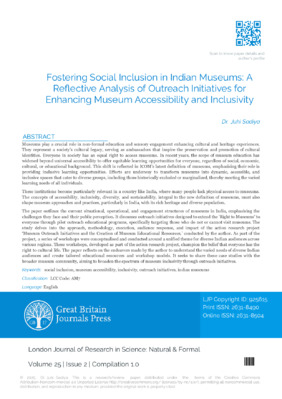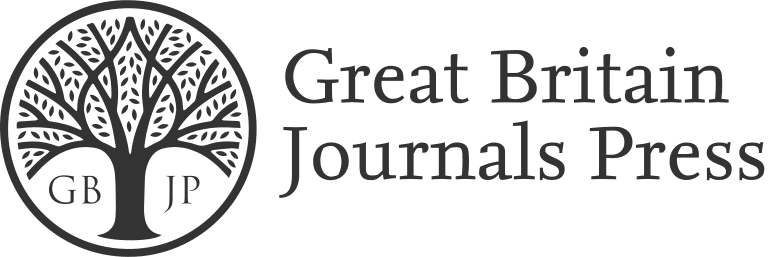Fostering Social Inclusion in Indian Museums: A Reflective Analysis of Outreach Initiatives for Enhancing Museum Accessibility and Inclusivity
Keywords:
Northern Harrat Rahat, Transitional crust, Elastic constants, Rheological properties, low-velocity and density zone, geothermal favorability., time dilation, twin paradox, Biological time, Biological clock, Relativistic effects, Proper time, Invariant ageing, Sm-Nd isotopic parameters, Rb-Sr isotopic parameters, Chondrites, Achondrites, Juvinas, White Dwarf Stars, Electron Degeneracy Pressure, Charged Black Holes, Schwarzschild Radius, Chandrasekhar Limit, Radius Calculations.Abstract
Museums play a crucial role in non-formal education and cultural enjoyment within the culture and heritage sector. They represent a society's cultural legacy and life, acting as cultural ambassadors that inspire the preservation and promotion of cultural identities. Everyone in society has an equal right to access museums. In recent years, the scope of museum education has widened beyond universal accessibility to offer equitable learning opportunities for everyone, regardless of social, economic, cultural, or educational background. This shift is reflected in the latest ICOM definition of museums, emphasizing their role in providing inclusive learning opportunities. Efforts are underway to transform museums into dynamic, accessible, and inclusive spaces that cater to diverse groups, including those historically excluded or marginalized, thereby meeting the varied learning needs of all individuals.
In a country like India, where many people lack physical access to museums, these institutions become particularly relevant. The concepts of accessibility, inclusivity, diversity, and sustainability, integral to the new definition of museums, must also underpin museum approaches and practices, especially in India, given its rich heritage and heterogeneous population.
The paper outlines the current situational, operational, and engagement structures of museums in India, highlighting the challenges they face and their public perception. It discusses the outreach initiatives aimed at extending the 'Right to Museums' to everyone through pilot outreach educational programs, specifically targeting those who do not, or cannot, visit museums. The study delves into the approach, methodology, execution, audience response, and impact of the action research project "Museum Outreach Initiatives and the Creation of Museum Educational Resources," conducted by the author. As part of the project, a series of workshops was conducted on a unified theme for diverse Indian audiences across various regions of the country. These workshops, developed under the action research project, champion the belief that everyone has a right to cultural life. The paper reflects on the endeavors made by the author to understand the varied needs of diverse Indian audiences and create tailored educational resources and workshop models. It seeks to share these case studies with the broader museum community, aiming to broaden the spectrum of museum inclusivity through outreach initiatives.
References

Downloads
Published
Issue
Section
License
Copyright (c) 2025 Authors and Global Journals Private Limited

This work is licensed under a Creative Commons Attribution 4.0 International License.





